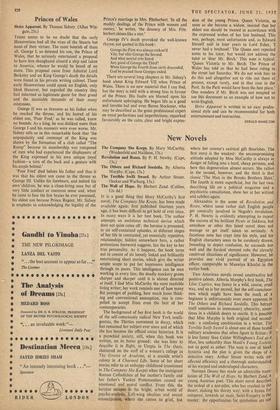Princes of Wales
Heirs Apparent. By Thomas Sidney. (Allan Win- gate, 25s.)
THERE seems to be no doubt that the early Hanoverians had all the vices of the Stuarts but none of their virtues. The most boorish of them all, George I, so detested his son, the Prince of Wales, that he seriously entertained a proposal to have him shanghaied aboard a ship and taken to America, whence he would be heard of no more. This proposal came from Admiral Lord Berkeley and on King George's death the details were found in his private writing cabinet. These early Hanoverians could speak no English, only liked Hanover, but regarded the country they had inherited as legitimate game for their greed and the insatiable demands of their many mistresses.
George II was as tiresome as his father when he reached the throne, and his hatred of his eldest son, 'Poor Fred,' as he was called, knew no bounds. As a king, he was disliked more than George I and his manners were even worse. Mr. Sidney tells us in this remarkable book that 'the unpopularity and contempt of the King was shown by the formation of a club called "The Rump" because its membership was composed of men who had experienced the displeasure of the King expressed in his own unique royal fashion—a turn of the back and a gesture with his ample behind.'
'Poor Fred' died before his father and thus it was that his eldest son came to the throne as George HI. Unlike his forebears, and indeed his own 'children, he was a clean-living man but of very little intellect or common sense and, when he came to lose the few brains he ever possessed, his eldest son became Prince Regent. Mr. Sidney is emphatic in acknowledging the legality of the • Prince's marriage to Mrs. Fitzherbert. 'In all the muddy dealings of the Prince with women and money,' he writes, 'the decency of Mrs. Fitz- herbert shines like a star.'
George IV's death provoked the well-known rhyme, not quoted in this book : George the First was always reckon'd Vile; but viler George the Second.
And what mortal ever heard Any good of George the Third?
When George the Fourth from earth descended, God be praised those Georges ended.
There are several long chapters in Mr. Sidney's book about King Edward VII when Prince of Wales. There is no new material that I can find, but the story is told with a strong bias in favour of the Prince. His faults are blamed upon his unfortunate upbringing. He began life as a good and lovable lad and even Baron Stockmar, who may be described as the great professional expert on royal perfections and imperfections, remarked favourably on the calm, clear and bright expres- sion of the young Prince. Queen Victoria, as soon as she became a widow, insisted that her eldest son should be treated in accordance with the expressed wishes of her late husband. This was, perhaps, most unfortunate and, as Edward himself said in later years to Lord Esher, 'I never had a boyhood.' The Queen sent repeated notes to his tutor, but would not address the tutor as 'dear Mr. Birch.' This note is typical. 'Queen Victoria to Mr. Birch. The Prince of Wales has told us that he had been riding in the street last Saturday. We do not wish him to do this and altogether not to ride out there at present, except rarely, and in that case in the Park. In the Park would have been the best place.' One wonders if Mr. Birch was not tempted to use this document as an example of how not to write English.
Heirs Apparent is written in an easy profes- sional style and can be recommended for both entertainment and instruction.
GERALD HAMILTON


































 Previous page
Previous page